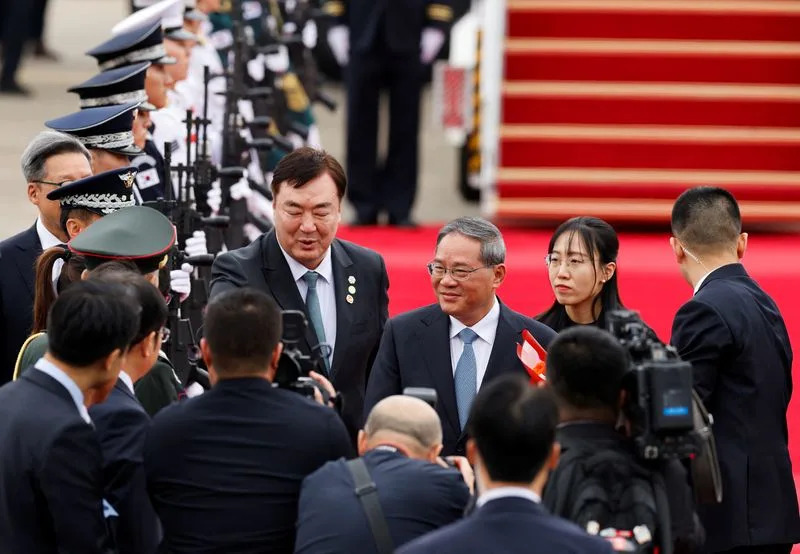Chinese Premier Li Qiang agreed with South Korean President Yoon Suk Yeol on Sunday to launch a diplomatic and security dialogue and resume free trade talks, and discussed tensions around Taiwan with Japanese Prime Minister Fumio Kishida.
The leaders held bilateral meetings in Seoul a day before the first summit by the three Asian neighbours in more than four years.
China and the U.S.-allied South Korea and Japan are trying to manage rising distrust amid the rivalry between Beijing and Washington and tensions over Taiwan.
Expectations are low for Monday's trilateral summit, but even handshakes would help maintain at least some high-level diplomacy after years of deteriorating relations, diplomats and officials say.
Yoon told Li that South Korea and China should work together not only to promote shared interests based on mutual respect but also on regional and global issues to tackle common challenges, citing Russia's invasion of Ukraine, the Israel-Hamas conflict and global economic uncertainties.
Get AfriPrime Android Web View app....Click the link to Amazon app store to download https://rb.gy/3xek46
"I hope to continue to strengthen bilateral cooperation even in the face of today's global complex crises," Yoon said at the start of the meeting, according to his office.
Yoon asked China to play a greater role as a permanent member of the U.N. Security Council, especially as North Korea continues to develop nuclear missiles and boost military cooperation with Russia, saying another spy satellite launch using intercontinental ballistic-missile technology is imminent.
Li told Yoon their countries should oppose turning economic and trade issues into political or security ones, and should work to maintain stable supply chains, Chinese state news agency Xinhua reported.
Li said China was ready to strengthen cooperation in high-end manufacturing, new energy, artificial intelligence, biomedicine and other fields.
China will further expand market access, strengthen guarantees for foreign investment and welcomes more South Korean companies do business in the country, he said. In a separate meeting with Samsung Chairman Jay Y. Lee, Li encouraged the Korean tech giant to boost its investment in China.
In recent years, Chinese leaders and diplomats have frequently condemned the U.S. and its allies over export controls targeting its semiconductor industry by calling on these countries to stop "overstretching the concept of national security".
Since 2021, Chinese companies and state entities have been increasingly cut off from ready access to the world's most advanced chips, many of them produced by South Korean tech giants, such as Samsung and SK Hynix.
Li expressed hopes for continuing efforts to "build consensus and resolve differences" through "equal dialogue and sincere communications."
Get AfriPrime Android Web View app....Click the link to Amazon app store to download https://rb.gy/3xek46
PRACTICAL COOPERATION
The three leaders attended a banquet where multicultural choirs and bands performed traditional and modern songs, while the menu included tofu, dumplings and bean pastes - cuisine staples in all three countries.
At a separate meeting with Kishida, Yoon lauded progress on diplomatic, economic and cultural exchanges with Japan, and they agreed to deepen ties next year when the two countries celebrate the 60th anniversary of normalising relations, Yoon's office said.
Kishida also met separately with Li, stressing the importance of the stability of the Taiwan Strait for Japan and the international community.
Li told Kishida that he hoped Japan would "properly handle issues like Taiwan", Chinese state broadcaster CCTV reported.
Kishida told reporters after the meeting he had asked Beijing to lift an import ban on Japanese seafood, imposed after Japan began releasing treated wastewater from the wrecked Fukushima nuclear plant into the Pacific.
He also asked for the early release of Japanese citizens detained in China.
China and Japan agreed to hold a new round of bilateral high-level economic dialogue at an appropriate time, according to CCTV.
The three neighbours had agreed to hold annual summits starting in 2008, but bilateral feuds and the COVID-19 pandemic disrupted the initiative, with the last three-way summit held in late 2019.
Yoon, Li and Kishida will adopt a joint statement on six areas including the economy and trade, science and technology, people-to-people exchanges and health and the aging population, Seoul officials said.
The summit comes as South Korea and Japan have been working to mend ties frayed by historical disputes while deepening a trilateral security partnership with the United States amid its intensifying rivalry with China.
Beijing has previously warned that U.S. efforts to further elevate relations with South Korea and Japan could fan regional tension and confrontation.
Seoul and Tokyo have warned against any attempts to forcibly change the status quo in the Taiwan Strait, while Beijing on Tuesday criticised a decision by South Korean and Japanese lawmakers to attend Taiwanese President Lai Ching-te's inauguration.
Get AfriPrime Android Web View app....Click the link to Amazon app store to download https://rb.gy/3xek46
South Korean, Chinese and Japanese leaders discuss thorny topics and ways to boost cooperation
The Japanese and South Korean leaders raised sensitive topics like Taiwan, North Korea and the South China Sea as well as ways to boost cooperation when they individually met China's premier Sunday on the eve of a fuller trilateral meeting.
It was unclear how serious discussions the three leaders had on those thorny issues, which are not among the official agenda items for Monday's three-way gathering in Seoul, the first of its kind in more than four years.
No major announcement is expected from the meeting, but observers say that just resuming the highest-level talks among the three Northeast Asian neighbors is a good sign and suggests they are intent on improving relations. Their trilateral meeting was supposed to happen annually but it had stalled since the last one in December 2019 because of the COVID-19 pandemic and complex ties among the three countries.
After meeting Chinese Premier Li Qiang, Japanese Prime Minister Fumio Kishida told reporters that he expressed serious concerns about the situations in the South China Sea, Hong Kong and China's northwestern Xinjiang region. He said Japan is closely monitoring developments on self-governed Taiwan.
He referred to China's military assertiveness in the South China Sea, clampdowns of pro-democracy movements in Hong Kong and human rights abuses against minorities in Xinjiang. Last week, China also launched a large military exercise around Taiwan to show its anger over the inauguration of the island's new president who refuses to accept its insistence that Taiwan is part of China.
During a separate meeting with Li, South Korean President Yoon Suk Yeol, on his part, asked China, as a permanent member of the U.N. Security Council, to contribute to promoting peace on the Korean Peninsula, while speaking about North Korea’s nuclear program and its deepening military ties with Russia, according to Yoon's office.
Yoon’s office said Yoon and Kishida in their separate meeting expressed worries about North Korea’s nuclear program and agreed to strengthen their cooperation with the United States.
South Korea, Japan and the U.S. have long urged China — North Korea’s major ally and economic pipeline — to use its leverage to persuade the North to abandon its nuclear ambitions. But China is suspected of avoiding fully enforcing U.N. sanctions on North Korea and sending clandestine aid shipments to help its impoverished neighbor stay afloat.
The three leaders also discussed how to bolster economic and other cooperation.
Yoon and Li agreed to launch a new South Korean-Chinese dialogue channel involving senior diplomats and defense officials in mid-June. They also agreed to restart negotiations to expand the free trade agreement and reactivate dormant bodies on personnel exchanges, investments and other issues, according to Yoon’s office.
Chinese state media reported Li told Yoon that the two countries should safeguard the stability of their deeply intertwined industrial and supply chains and resist turning economic and trade issues into political and security-related issues.
Kishida said he and Li reaffirmed Japan and China will seek progress on various areas to promote mutually beneficial relations. Kishida and Yoon also said they agreed to further strengthen ties, which have warmed significantly since last year following an earlier setback over issues related to Japan's 1910-45 colonial rule of the Korean Peninsula.
Get AfriPrime Android Web View app....Click the link to Amazon app store to download https://rb.gy/3xek46
South Korean officials said that a joint statement after Monday’s trilateral meeting will cover the leaders’ discussion on cooperation in areas like people-to-people exchanges, climate change, trade, health issues, technology and disaster responses.
The three Asian nations are important trading partners and their cooperation is key to promoting regional peace and prosperity. They together make up about 25% of global gross domestic product. But the three countries have been repeatedly embroiled in bitter disputes over a range of historical and diplomatic issues originating from Japan’s wartime atrocities. China’s rise and a U.S. push reinforce its Asian alliances have also significantly impacted their three-way ties in recent years.
Experts say South Korea, China and Japan now share a need to improve ties. South Korea and Japan want better ties with China because it is their biggest trading partner. China, for its part, likely believes a further strengthening of the South Korea-Japan-U.S. cooperation would hurt its national interests.
China, meanwhile, has always sent its premier, the country’s No. 2 official, to the trilateral leaders’ meeting since its first session in 2008. Observers say China earlier argued that under then-collective leadership, its premier was chiefly in charge of economic affairs and best suited to attend the meeting, which largely focuses on economic issues.
But they say China may face more demands for President Xi Jinping to attend because he has concentrated power in his hands and defied the norms of collective leadership.
Get AfriPrime Android Web View app....Click the link to Amazon app store to download https://rb.gy/3xek46



